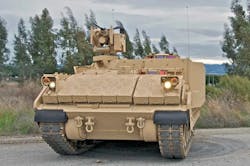BAE Systems to build networked AMPV armored combat vehicles and vetronics for mobile battlefield command
WARREN, Mich. – Engineers at BAE Systems will build networked armored combat vehicles that will take-on battlefield duties as armored ambulances, mortar carriers, engineer vehicles, and command vehicles, under terms of a $754.3 million order announced Wednesday.
Officials of the U.S. Army Contracting Command at Detroit Arsenal in Warren, Mich., are asking the BAE Systems Platforms & Services segment in York, Pa., for Armored Multi-Purpose Vehicles (AMPV).
The Army's AMPV networked armored combat vehicle program consists of five vehicle variants: general purpose, mission command, mortar carrier, medical evaluation, and medical treatment vehicles. The contract is for early-order material in support of future AMPV purchase, and facility-capacity-expansion efforts to increase AMPV production.
The AMPV, which is to replace the Army’s Vietnam-era M113 family of combat vehicles, and also will back-up the BAE Systems M2A3 Bradley Fighting Vehicle on the battlefield.
The AMPV program calls for vetronics and software that adhere to the U.S. military's Vehicle Integration for C4ISR/EW Interoperability (VICTORY) standards, which use an adopt-adapt-author approach independent of specific hardware or software.
The program aims to provide the Army with a survivable and mobile fleet of vehicles to replace the M113. The AMPV capitalizes on the Bradley Fighting Vehicle and M109A7 advanced Paladin self-propelled artillery designs to enable the AMPV to maneuver with other modern combat vehicles in the Army's armored brigade combat team (ABCT).
Last September BAE Systems won a $432.6 million order for additional AMPVs, and a $400.9 million order in January 2020 to build 160 new AMPVs. That order was a modification to a potential $1.2 billion contract awarded to BAE Systems in late 2014 to develop and build the AMPV. BAE Systems engineers are designing the new vehicle to accommodate periodic technology upgrades.
The original 52-month contract called for BAE Systems to build 29 AMPVs across each of the variants. The award also provided an option to begin the low-rate initial production (LRIP) phase.
In 2017 BAE Systems won a $15.2 million order to upgrade the vetronics architecture of the AMPV with battlefield networking capability to enable the AMPV to be part of secure wireless networks to coordinate communications and tactics among other combat vehicles and command echelons, as well as provide networking among the vehicle's on-board systems.
On this order BAE Systems will do the work in York, Pa., and should be finished by February 2027. For more information contact BAE Systems Platforms & Services online at www.baesystems.com, or the Army Tank-Automotive & Armaments Command at www.tacom.army.mil.

John Keller | Editor-in-Chief
John Keller is the Editor-in-Chief, Military & Aerospace Electronics Magazine--provides extensive coverage and analysis of enabling electronics and optoelectronic technologies in military, space and commercial aviation applications. John has been a member of the Military & Aerospace Electronics staff since 1989 and chief editor since 1995.

